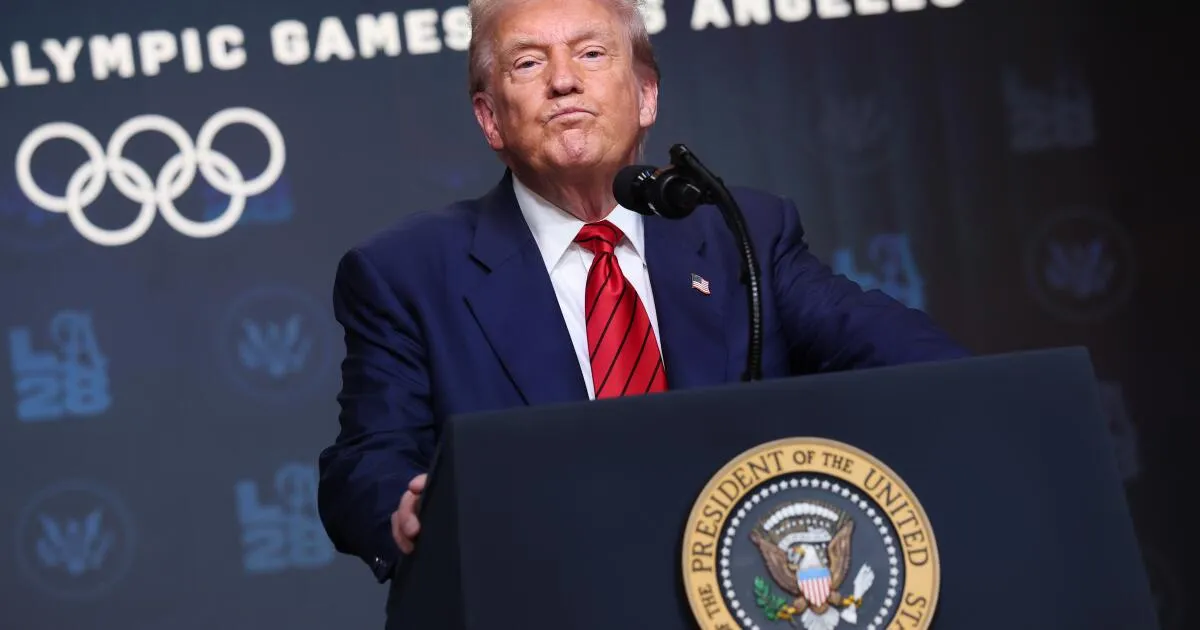
Local officials and advocates for the homeless community are increasingly anxious about the possibility of President Trump implementing severe measures against homeless individuals during the upcoming 2028 Olympic Games in Los Angeles. Recently, Trump has taken charge of an Olympics task force and is exerting control over local law enforcement in Washington, D.C., declaring intentions to relocate homeless individuals “FAR from the Capital.” This has raised alarms among experts and advocates alike regarding potential actions that could impact the homeless population during the Olympic festivities.
Gary Blasi, a professor emeritus at UCLA School of Law and a prominent researcher on homelessness, expressed his concerns, stating, “Based on everything that has happened so far, I think you would have to be irrational not to worry about a worst-case scenario during the Games, where federal troops are effectively forcing poor people on the street to relocate to what is essentially a detention center somewhere out of sight.” The fear is that federal intervention may lead to significant human rights violations against vulnerable populations.
On Tuesday, White House Press Secretary Karoline Leavitt announced that D.C. police and federal agents would begin clearing homeless encampments in the capital, offering individuals the choice of accepting shelter services or facing fines and potential jail time. Leavitt indicated that the administration is also considering options to relocate homeless individuals far from the city, although there has been no definitive plan disclosed regarding homelessness in Los Angeles as the city prepares for the Olympics.
In stark contrast to Trump's approach, local officials in Los Angeles are striving to present a compassionate and humane response to the homelessness crisis. Mayor Karen Bass has publicly committed to not repeating past practices of relocating homeless individuals during major events. In previous Olympics, cities like Paris and Los Angeles have engaged in measures that effectively displaced the homeless. However, Bass stated, “I would not bus homeless people out of the city,” emphasizing her administration’s focus on “housing people first.”
The Los Angeles County Board of Supervisors has also prioritized the development of a comprehensive plan to address homelessness, aiming to establish permanent housing solutions rather than temporary fixes. Despite recognizing the need to manage encampments near Olympic venues for security reasons, the supervisors emphasized the importance of humane treatment and long-term solutions.
In Washington D.C., Trump has taken control of the city’s police department and deployed the National Guard to maintain order, threatening to send military forces to Los Angeles if deemed necessary during the Olympics. Supervisor Janice Hahn criticized this federal approach, stating that “federalizing local law enforcement and sending the U.S. military to American cities is what tyrants do.” She highlighted the adverse effects of cutting social safety net programs, which are essential for addressing homelessness comprehensively.
As local officials prepare for the Olympics, the overarching concern remains how federal policies may affect homelessness in Los Angeles. Nithya Raman, chair of the L.A. City Council’s housing and homelessness committee, stressed that any actions similar to those threatened in D.C. would have “staggering” repercussions for the region's homeless population. Meanwhile, Supervisor Lindsey Horvath reaffirmed the county’s commitment to humane solutions despite the federal government’s dehumanizing tactics.
Advocates like Katie Hill, former member of Congress, are concerned that federal actions during the Games could lead to the “mass institutionalization” of homeless individuals, echoing the conditions seen in immigration detention facilities. “There is a lot of federal facilities and land that they could use potentially as a detention facility,” Hill warned, emphasizing the need for humane treatment.
Despite these concerns, Los Angeles has made strides in addressing homelessness. Under Mayor Bass's Inside Safe program, individuals are offered housing and services before any encampment clearings, ensuring that no fines or jail time are imposed for refusing assistance. Data indicates that homelessness in L.A. County has decreased by 14% in the past two years, highlighting the effectiveness of local initiatives.
As the 2028 Olympics approach, the collaboration between local officials and community organizations will be crucial in ensuring that the needs of the homeless are prioritized. However, funding constraints pose a significant challenge. Advocates argue that increased resources are necessary to address homelessness effectively, allowing Los Angeles to navigate its crisis independently of the Trump administration's potentially harmful policies.